Monday, March 28, 2005
Quack! Quack! Whack!
We enjoyed the traditional duck for Easter dinner. It was extremely fresh.
I didn't think through the logistics very well. I went to visit the poultry guy at our local bazaar on Saturday morning to inquire about his duck supply. I told him I wanted a big, fat duck. Ducks aren't in big demand here so he didn't have any on hand, but he told me that I should come back Sunday morning. I was pleased with the outcome of this negotiation, particularly since it was conducted all in Azeri.
I don't know why I thought that when I came back Sunday morning the duck would be all nicely wrapped and ready for me to take home.
Really, after this long, I should know better.
There was a duck waiting for me alright -- a nice khaki colored one, sitting in a cage on top of the hens.
QUACK, QUACK, WHACK!
This is a one-stop butchery, so the owner's wife, in a headscarf, had the water boiling, ready for quick defeathering. Within five minutes, she handed my duck over to me, neck and innards stuffed inside, with a big gold smile. The owner told me to come back for anything else I needed.
I told him I needed a chicken, too, since that duck was pretty small and not at all fat. Lucky for me, there were some hens available that were not as fresh as my duck but didn't require my involvement in their execution.
Memo to self: Ducks in Azerbaijan run around and swim and behave like normal ducks, so they are tough and sinewy, with no actual meat on their bones. Despite The Producer's skill in the kitchen and it being Easter, he is not the messiah and could not feed a small crowd with one skinny duck and a small roasted hen.
We stuffed them, Azeri style, with walnuts, onions and raisins and served them on couscous. While the duck was nearly meatless, the hen was absolutely delicious.
Despite (or, perhaps, because of) plenty of wine, the coarser elements at the table could not resist gnawing on the carcasses.
Our Azeri friend brought a wonderful apple pie, with a homemade crust and Granny Smith apples from Washington.
Her biggest logistical problem was finding shortening.
I didn't think through the logistics very well. I went to visit the poultry guy at our local bazaar on Saturday morning to inquire about his duck supply. I told him I wanted a big, fat duck. Ducks aren't in big demand here so he didn't have any on hand, but he told me that I should come back Sunday morning. I was pleased with the outcome of this negotiation, particularly since it was conducted all in Azeri.
I don't know why I thought that when I came back Sunday morning the duck would be all nicely wrapped and ready for me to take home.
Really, after this long, I should know better.
There was a duck waiting for me alright -- a nice khaki colored one, sitting in a cage on top of the hens.
QUACK, QUACK, WHACK!
This is a one-stop butchery, so the owner's wife, in a headscarf, had the water boiling, ready for quick defeathering. Within five minutes, she handed my duck over to me, neck and innards stuffed inside, with a big gold smile. The owner told me to come back for anything else I needed.
I told him I needed a chicken, too, since that duck was pretty small and not at all fat. Lucky for me, there were some hens available that were not as fresh as my duck but didn't require my involvement in their execution.
Memo to self: Ducks in Azerbaijan run around and swim and behave like normal ducks, so they are tough and sinewy, with no actual meat on their bones. Despite The Producer's skill in the kitchen and it being Easter, he is not the messiah and could not feed a small crowd with one skinny duck and a small roasted hen.
We stuffed them, Azeri style, with walnuts, onions and raisins and served them on couscous. While the duck was nearly meatless, the hen was absolutely delicious.
Despite (or, perhaps, because of) plenty of wine, the coarser elements at the table could not resist gnawing on the carcasses.
Our Azeri friend brought a wonderful apple pie, with a homemade crust and Granny Smith apples from Washington.
Her biggest logistical problem was finding shortening.
Saturday, March 26, 2005
Helpful Explanation
This primer on pronumications in the Kyrgyz language is interesting. Indeed, much of it is also applicable to Azeri, which is also a Turkic language.
Unlike Kyrgyz, which is written in the Russian cyrillic alphabet, Azeri uses a modified Latin alphabet. Furthermore, many more Kyrgyz use Russian in daily life than do Azeris. From what I've seen, people who speak primarily Kyrygz are viewed as rubes because anyone who is educated knows Russian. The same is somewhat true in Azerbaijan, but many Azeris now reject Russian as the colonial language. Still, there are a lot of "educated" people in Azerbaijan who are much more comfortable speaking in Russian than Azeri.
These people annoy me since they respond in Russian when I try to speak to them in Azeri.
Unlike Kyrgyz, which is written in the Russian cyrillic alphabet, Azeri uses a modified Latin alphabet. Furthermore, many more Kyrgyz use Russian in daily life than do Azeris. From what I've seen, people who speak primarily Kyrygz are viewed as rubes because anyone who is educated knows Russian. The same is somewhat true in Azerbaijan, but many Azeris now reject Russian as the colonial language. Still, there are a lot of "educated" people in Azerbaijan who are much more comfortable speaking in Russian than Azeri.
These people annoy me since they respond in Russian when I try to speak to them in Azeri.
Monday, March 21, 2005
Fire Jumping
After coming home from our Absheron Adventure, I joined my neighbors for a little Novruz fire jumping.
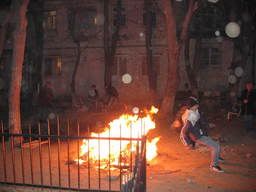
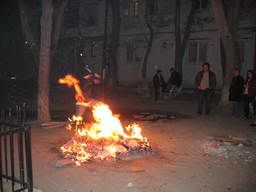


Sunday, March 20, 2005
Absheron Adventure
If there is a more polluted place on this earth I cannot imagine what it looks like.
Some friends and I explored the Absheron peninsula today in the Super Neva (got a map? Know where Azerbaijan is? See that thing that looks like a beak sticking into the Caspian? That's the Absheron Peninsula). It has been the center of oil production in Azerbaijan since the early 19th century. It is an absolutely breathtaking mess.
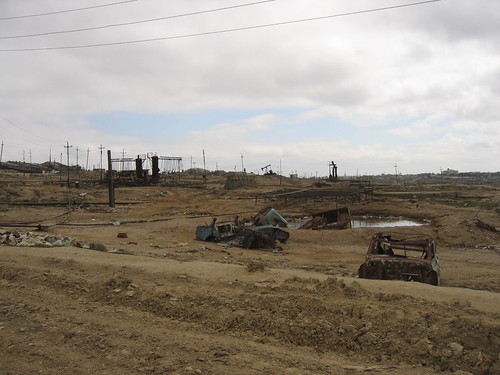
Near the town of Suraxani

Care for a swim?
We explored fire temples and took unmarked roads through barely functioning oil fields filled with rusting pipes, car frames, trash piles, oil ponds and "nodding donkeys." People live amongst all this debris and devastation in dun colored brick homes. And this isn't just one neighborhood. It's miles and miles and miles of industrial wasteland.
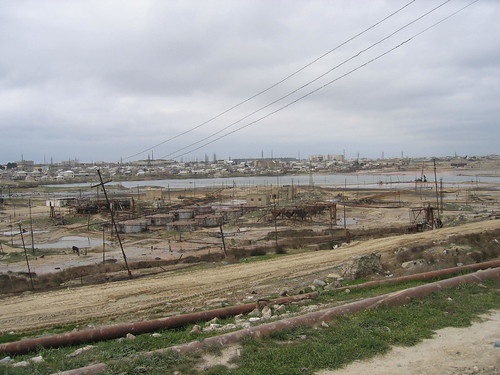
People live among these ruins.
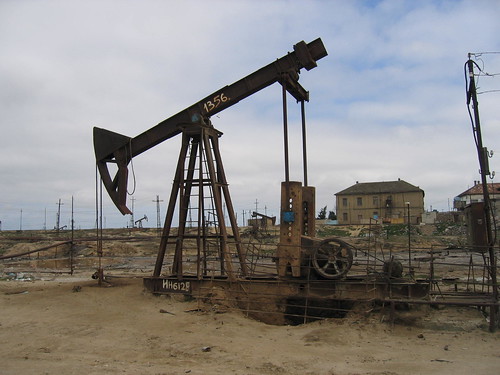
Nodding donkey
We took a causeway to an island just off the shore that's sinking into the rising Caspian. At its northern tip lay the offshore ruins of Soviet-Era derricks and platforms. Some were connected by dirt jetties. We drove as far as we could then stopped for a picnic amid the steel graveyards. It was too windy to sit outside, so we ate our cheese, sausage and mandarins in the car.
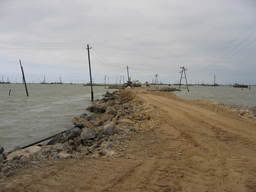
Drive until you can't drive any farther
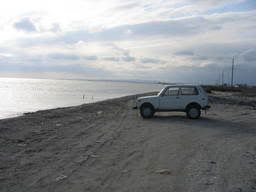
You can't go farther east in a Neva.
Some friends and I explored the Absheron peninsula today in the Super Neva (got a map? Know where Azerbaijan is? See that thing that looks like a beak sticking into the Caspian? That's the Absheron Peninsula). It has been the center of oil production in Azerbaijan since the early 19th century. It is an absolutely breathtaking mess.

Near the town of Suraxani

Care for a swim?
We explored fire temples and took unmarked roads through barely functioning oil fields filled with rusting pipes, car frames, trash piles, oil ponds and "nodding donkeys." People live amongst all this debris and devastation in dun colored brick homes. And this isn't just one neighborhood. It's miles and miles and miles of industrial wasteland.

People live among these ruins.

Nodding donkey
We took a causeway to an island just off the shore that's sinking into the rising Caspian. At its northern tip lay the offshore ruins of Soviet-Era derricks and platforms. Some were connected by dirt jetties. We drove as far as we could then stopped for a picnic amid the steel graveyards. It was too windy to sit outside, so we ate our cheese, sausage and mandarins in the car.

Drive until you can't drive any farther

You can't go farther east in a Neva.
Saturday, March 19, 2005
Oops I did it again
Been feeling a litle discouraged lately, so I thought I'd go see my dealer.
He did me right.
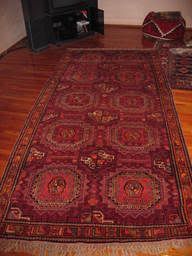
He told me this a Talish or Lankoran carpet, but I am not sure if I believe him. It does have some color similarities to my other one. However, the pattern and border are quite different. I'll have to do some pattern research and see what I can learn.
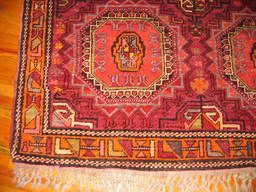
He did me right.

He told me this a Talish or Lankoran carpet, but I am not sure if I believe him. It does have some color similarities to my other one. However, the pattern and border are quite different. I'll have to do some pattern research and see what I can learn.

US Priorities for Democracy Building
Check out this interesting Washington Post piece about US funding priorities for democracy activities, particularly in Muslim countries.
Wednesday, March 16, 2005
Central Asia's North Korea, Here We Come
Oh boy, oh boy, we're planning a trip to Turkmenistan in April!
It's a huge hassle to get visas, and we've only got about a 50% chance of getting one. Plus we have to go on a tour.
Still, some friends just came back (see photos at expat monkey) and we decided it was just the place for us.
You may have heard about Turkmenistan only because its President-for-Life, Sapurmurat Nayizov (who named himself Turkmenbashi -- father of all Turks), has:
--Renamed all the planets after himself and his mother;
--Required that university students study his own book, to the exclusion of all other subjects;
--Built an enormous gold statue of himself in Ashgabat, the capital, that rotates so he is always facing the sun.
--Recently closed all the hospitals in the country, under the logic that anyone who is sick can come to Ashgabat for treatment.
--Has razed all the traditional housing in Ashgabat and replaced it with high rise marble apartments, linked by brand new, four lane thoroughfares that have absolutely no cars on them.
It's always hard to decide where to go when we need a break. Naturally, we want to go west where life is convenient, but coming back to Baku is a real drag. We decided to go east, instead, to check out one of the world's most repressive and authoritarian regimes, to appreciate more what we have here.
If we don't get visas, I don't know where we'll go. Maybe Spain.
It's a huge hassle to get visas, and we've only got about a 50% chance of getting one. Plus we have to go on a tour.
Still, some friends just came back (see photos at expat monkey) and we decided it was just the place for us.
You may have heard about Turkmenistan only because its President-for-Life, Sapurmurat Nayizov (who named himself Turkmenbashi -- father of all Turks), has:
--Renamed all the planets after himself and his mother;
--Required that university students study his own book, to the exclusion of all other subjects;
--Built an enormous gold statue of himself in Ashgabat, the capital, that rotates so he is always facing the sun.
--Recently closed all the hospitals in the country, under the logic that anyone who is sick can come to Ashgabat for treatment.
--Has razed all the traditional housing in Ashgabat and replaced it with high rise marble apartments, linked by brand new, four lane thoroughfares that have absolutely no cars on them.
It's always hard to decide where to go when we need a break. Naturally, we want to go west where life is convenient, but coming back to Baku is a real drag. We decided to go east, instead, to check out one of the world's most repressive and authoritarian regimes, to appreciate more what we have here.
If we don't get visas, I don't know where we'll go. Maybe Spain.
Wanted: a padded suit and a helmet
I wish I could provide some verification that I don't make this stuff up.
This morning while getting ready for work, exactly one week after removing the cast from the last bone he broke, The Producer slipped on the bathroom floor and fell onto the bathtub, cracking a rib.
Go ahead. Ask it. I did.
"Had you been drinking?"
My helpful staff suggested he start eating Xas (pro: Hash) everyday. Apparently, this sheep's head soup is very good for broken bones AND hangovers, thus covering all the bases.
This morning while getting ready for work, exactly one week after removing the cast from the last bone he broke, The Producer slipped on the bathroom floor and fell onto the bathtub, cracking a rib.
Go ahead. Ask it. I did.
"Had you been drinking?"
My helpful staff suggested he start eating Xas (pro: Hash) everyday. Apparently, this sheep's head soup is very good for broken bones AND hangovers, thus covering all the bases.
Sabotage!
We, and our Neva, were victims of sabotage Saturday night!
I came out Sunday morning, eager to do my errands in a car, only to find the two right side tires flabby flat.
This was preposterous. There was only one explanation: Sabotage!
But who hates our Neva? Did I park in someone's spot? Were the pock-faced teenage boys in our court yard trying to impress me? Is there a jealous Toyota rep in Baku?
Even though I told the courtyard kids to track down the perp (they were so effective with the maniac), the mystery may never be solved.
All we know is that someone punctured the sides with something sharp.
Fortunately, you don't buy new tires when something like this happens. You send the flat ones to the tire master, who plugs the hole and charges you $8.
Now I park the Neva in our garage.
I came out Sunday morning, eager to do my errands in a car, only to find the two right side tires flabby flat.
This was preposterous. There was only one explanation: Sabotage!
But who hates our Neva? Did I park in someone's spot? Were the pock-faced teenage boys in our court yard trying to impress me? Is there a jealous Toyota rep in Baku?
Even though I told the courtyard kids to track down the perp (they were so effective with the maniac), the mystery may never be solved.
All we know is that someone punctured the sides with something sharp.
Fortunately, you don't buy new tires when something like this happens. You send the flat ones to the tire master, who plugs the hole and charges you $8.
Now I park the Neva in our garage.
Novruz Fever is Sweeping the Nation
Novruz is the Persian New Year and celebrations started yesterday, the last Tuesday of the year. The big days are Sunday and Monday, the first day of spring.
Yesterday was the day of fires. People everywhere start bonfires in the streets, or perhaps, the courtyard of your apartment building, and, in an effort to ensure good luck in the coming year, jump over them seven times. The courtyard kids invited me to their fire for some jumping, but unfortunately, I had alternate plans. Sunday, apparently, is the main fire jumping day, so I may yet get my chance.
It's quite a sight to see bonfires burning in the streets throughout the city, unaccompanied by looting.
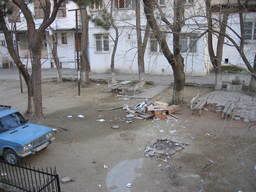
It may look like a pile of trash, but it became a bonfire.
For weeks, vendors have been selling little patches of grass called semeni that are designed to serve as a table centerpiece -- not unlike our Easter grass. Indeed, some vendors place toy chicks in the grass. People also make special sweets and serve them up on a platter, with bits of wheat and barley and other seeds mixed in. Samaya, our cleaning lady delivered one such platter and semeni to us.
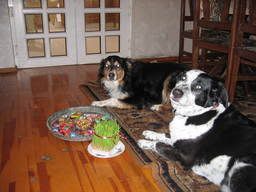
Dogs like Novruz too
The fire jumping is just one of a number of distinctly Zoroastrian rituals related to fire that have survived not only communism but Islam as well. There are many areas on the Absheron peninsula where oil seeps out of the ground naturally and catches on fire (other places it just makes big black puddles). It's also common to see flames engraved on old Muslim-style gravestones (100-200 years or older) alongside the more traditional Islamic symbols. It's not surprising that Zarathrustra, the "prophet" of Zoroastrianism who spent most of his life on the Absheron peninsula, incorporated many fire images in the practice of the faith.
Azerbaijan: the Fire Land.
Yesterday was the day of fires. People everywhere start bonfires in the streets, or perhaps, the courtyard of your apartment building, and, in an effort to ensure good luck in the coming year, jump over them seven times. The courtyard kids invited me to their fire for some jumping, but unfortunately, I had alternate plans. Sunday, apparently, is the main fire jumping day, so I may yet get my chance.
It's quite a sight to see bonfires burning in the streets throughout the city, unaccompanied by looting.

It may look like a pile of trash, but it became a bonfire.
For weeks, vendors have been selling little patches of grass called semeni that are designed to serve as a table centerpiece -- not unlike our Easter grass. Indeed, some vendors place toy chicks in the grass. People also make special sweets and serve them up on a platter, with bits of wheat and barley and other seeds mixed in. Samaya, our cleaning lady delivered one such platter and semeni to us.

Dogs like Novruz too
The fire jumping is just one of a number of distinctly Zoroastrian rituals related to fire that have survived not only communism but Islam as well. There are many areas on the Absheron peninsula where oil seeps out of the ground naturally and catches on fire (other places it just makes big black puddles). It's also common to see flames engraved on old Muslim-style gravestones (100-200 years or older) alongside the more traditional Islamic symbols. It's not surprising that Zarathrustra, the "prophet" of Zoroastrianism who spent most of his life on the Absheron peninsula, incorporated many fire images in the practice of the faith.
Azerbaijan: the Fire Land.
Sunday, March 13, 2005
Carpet Buying Revelation
It's been four months since I've bought a carpet and I desperately need one in my new office. I paid a visit to my main man, Ruslan, who operates Flying Carpet Shop in an underground stone room in the 16th century Hamman (bathhouse) in Baku's Old City.
Ruslan is carpet dealer to most US Embassy staff and US NGO workers here. Initially, I was skeptical. With a client base like this, he hasn't got much incentive to bargain.
Ruslan earned my slavish devotion during a negotiation session when I first arrived. He wanted $650 for two pieces -- a Guba carpet and a Dagestan sumac. I wanted to pay around $500, so I offered $450. He took me aside and quietly punched in three numbers on his calculator --$425.
Never in the history of carpet bargaining has such an effective sales tactic been employed. I wouldn't have been more surprised if he had offered me a vial of crack.
Which, in effect, he did.
Since then, I have sent every visiting friend and casual acquaintance to Ruslan. He pays me back with rock-bottom prices and a keen sense of what I like. He doesn't waste my time showing me Iranian, Afghan or Turkmen samples that he knows aren't as nice as ones I could get in-country.
Besides, he hates Iranian carpets.
"Most Iranians are Farsi," he says with a sneer. "They know nothing about carpets. Its the 30 million Azeris that live in Iran that make good carpets." He's probably right, except for 30 million number.
Azeri carpets are an acquired taste. I have taken to them like an addict to crystal meth. I purposely avoid the quarter of the Old City that holds Ruslan's shop. His sales techniques are never aggressive, but highly effective.
Yesterday was the first time I've walked in with the intention of buying without actually having done so. Ruslan good naturedly accepted my ambivalence about his current stock and promised to call me when something he thinks I'll like comes in.
Ruslan has a lot of excellent quality new carpets. The knots are tight, colors pleasing and patterns traditional. They are also more expensive because they are made in "factories" (which are probably a single room with a few women sitting at looms all day, getting paid to weave carpets).
These carpets are lovely, but they lack something.
The ones I like tend to be homemade. They might have looser knots and may not lie exactly flat. Their patterns are uneven and don't always match up. They are made, as Ruslan says, "after dark, when the children and the husband are asleep and the woman has time to sit at a loom to make carpet for her daughter's dowry or her son's wife when she moves into the home."
Then, depending on the audience, he launches into his rapturous finale. "These carpets are made with LOVE!" I have seen this technique melt certain visitors.
That's why I think I like my Guba carpet the least. Technically, it's an excellent piece, but it was factory-made and lacks character. My carpet from Lankoran is my favorite, even though its edges bunch up and trip me, it's missing fringe and the animals in its pattern are misshapen. But every time I look at it, I see something new.
I prefer to buy carpets from the people who make them, but most of the time that's not practical. Last fall, however, I managed to buy the horse blanket pictured below from the woman who made it in the mountain village of Lahic. I just got the roll of film with her photo developed.
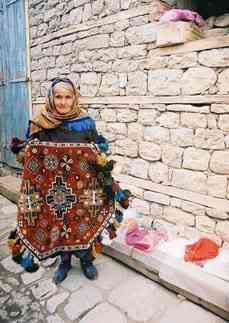
As soon as the snow melts, I want to go up to Lahic and see what she's been working on all winter.
Ruslan is carpet dealer to most US Embassy staff and US NGO workers here. Initially, I was skeptical. With a client base like this, he hasn't got much incentive to bargain.
Ruslan earned my slavish devotion during a negotiation session when I first arrived. He wanted $650 for two pieces -- a Guba carpet and a Dagestan sumac. I wanted to pay around $500, so I offered $450. He took me aside and quietly punched in three numbers on his calculator --$425.
Never in the history of carpet bargaining has such an effective sales tactic been employed. I wouldn't have been more surprised if he had offered me a vial of crack.
Which, in effect, he did.
Since then, I have sent every visiting friend and casual acquaintance to Ruslan. He pays me back with rock-bottom prices and a keen sense of what I like. He doesn't waste my time showing me Iranian, Afghan or Turkmen samples that he knows aren't as nice as ones I could get in-country.
Besides, he hates Iranian carpets.
"Most Iranians are Farsi," he says with a sneer. "They know nothing about carpets. Its the 30 million Azeris that live in Iran that make good carpets." He's probably right, except for 30 million number.
Azeri carpets are an acquired taste. I have taken to them like an addict to crystal meth. I purposely avoid the quarter of the Old City that holds Ruslan's shop. His sales techniques are never aggressive, but highly effective.
Yesterday was the first time I've walked in with the intention of buying without actually having done so. Ruslan good naturedly accepted my ambivalence about his current stock and promised to call me when something he thinks I'll like comes in.
Ruslan has a lot of excellent quality new carpets. The knots are tight, colors pleasing and patterns traditional. They are also more expensive because they are made in "factories" (which are probably a single room with a few women sitting at looms all day, getting paid to weave carpets).
These carpets are lovely, but they lack something.
The ones I like tend to be homemade. They might have looser knots and may not lie exactly flat. Their patterns are uneven and don't always match up. They are made, as Ruslan says, "after dark, when the children and the husband are asleep and the woman has time to sit at a loom to make carpet for her daughter's dowry or her son's wife when she moves into the home."
Then, depending on the audience, he launches into his rapturous finale. "These carpets are made with LOVE!" I have seen this technique melt certain visitors.
That's why I think I like my Guba carpet the least. Technically, it's an excellent piece, but it was factory-made and lacks character. My carpet from Lankoran is my favorite, even though its edges bunch up and trip me, it's missing fringe and the animals in its pattern are misshapen. But every time I look at it, I see something new.
I prefer to buy carpets from the people who make them, but most of the time that's not practical. Last fall, however, I managed to buy the horse blanket pictured below from the woman who made it in the mountain village of Lahic. I just got the roll of film with her photo developed.

As soon as the snow melts, I want to go up to Lahic and see what she's been working on all winter.
Saturday, March 12, 2005
Action!
Today was our first day of adventure with the Neva. I have to say, pound for pound, this car kicks our old Pathfinder's ass. As you can see the terrain is pretty rough. The car isn't terribly comfortable, but it's great off-road. Any road that isn't one of the country's two main highways probably falls into that category, so this is a very practical car.
So awsome. We should have done this a long time ago.
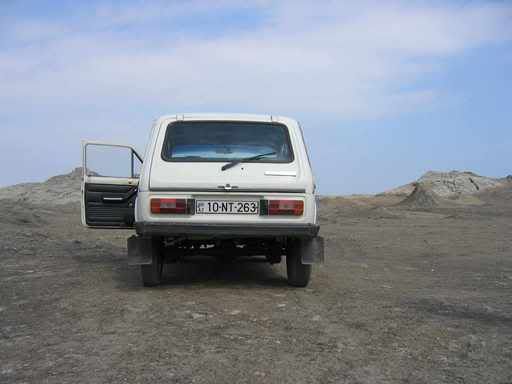
Check out that clearance!
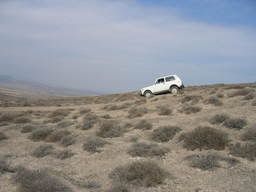
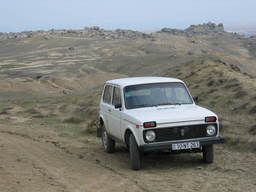
So awsome. We should have done this a long time ago.

Check out that clearance!


Thursday, March 10, 2005
Quashing Urban Myths Wherever They Arise
Exciting news!
I have determined that a Baku urban legend, the spread of which, admittedly, I contributed a great deal to, is false.
I put a local Caspian fish in the microwave and it did not spark.
I have determined that a Baku urban legend, the spread of which, admittedly, I contributed a great deal to, is false.
I put a local Caspian fish in the microwave and it did not spark.
Wednesday, March 09, 2005
I LOVE my Neva
"Oh, we'll just buy it for weekend excursions," we said.
"It's way too dangerous to drive in Baku," we thought.
Both of these assumptions have turned out to be false.
Sure, there are no apparent traffic laws other than "while you should feel free to run a red light at high speed while driving in the wrong lane, you absolutely cannot turn right on red," and "the car going the wrong way on a one-way street has the right of way."
The lack of rules -- and lanes -- is absolutely liberating. Driving in Baku is a blast and much, much less stressful than being a passenger. I have actually started driving the 20 blocks to my office, rather than using my driver. I am learning to ignore the stares.
Everyone knows that any woman who rides in the front seat of a car is a whore. A woman driving defies rational explanation. A foreign woman at the wheel of a NEVA is a sign of impending apocalypse.
The esteem in which my driver, Rashid, holds me increased exponentially after he followed me in his Volga. "I think American woman is too scared to drive in Baku!" he marveled. "Carpetblogger Xanim is a very good driver! Very fast!"
Some have suggested that he said this because I am his boss and reviews are coming up soon.
I even went to the gas station -- full serve, of course, like all civilized places. Gas is awfully expensive -- $10 to fill a Neva -- in a country that is sitting on some of the richest oil fields in the world. I said the Azeri equivalent of "Stop catching flies, boy, and fill 'er up with 96!" The "boy" ("malkchy" in Russian) is an important tool that should be used -- liberally -- to establish dominance over servants, such as waiters and gas station attendants.
Other than ignoring the gawking, the key to vehicular success is knowing that anything can happen at any time and it's up to you to be prepared for it. I learned this lesson driving in South Africa, so I feel very confident barreling around Baku in my little white tank.
Even if you do get pulled over by the "police", it will be for some completely arbitrary violation, like "speeding." The solution, as I understand it, is to:
Pay the bribe and be on your way;
Deny any common language with your interrogator until they give up and let you go;
Cry.
The latter two will be my favored strategies. I'm sure there will be ample opportunity to discover which is most effective.
"It's way too dangerous to drive in Baku," we thought.
Both of these assumptions have turned out to be false.
Sure, there are no apparent traffic laws other than "while you should feel free to run a red light at high speed while driving in the wrong lane, you absolutely cannot turn right on red," and "the car going the wrong way on a one-way street has the right of way."
The lack of rules -- and lanes -- is absolutely liberating. Driving in Baku is a blast and much, much less stressful than being a passenger. I have actually started driving the 20 blocks to my office, rather than using my driver. I am learning to ignore the stares.
Everyone knows that any woman who rides in the front seat of a car is a whore. A woman driving defies rational explanation. A foreign woman at the wheel of a NEVA is a sign of impending apocalypse.
The esteem in which my driver, Rashid, holds me increased exponentially after he followed me in his Volga. "I think American woman is too scared to drive in Baku!" he marveled. "Carpetblogger Xanim is a very good driver! Very fast!"
Some have suggested that he said this because I am his boss and reviews are coming up soon.
I even went to the gas station -- full serve, of course, like all civilized places. Gas is awfully expensive -- $10 to fill a Neva -- in a country that is sitting on some of the richest oil fields in the world. I said the Azeri equivalent of "Stop catching flies, boy, and fill 'er up with 96!" The "boy" ("malkchy" in Russian) is an important tool that should be used -- liberally -- to establish dominance over servants, such as waiters and gas station attendants.
Other than ignoring the gawking, the key to vehicular success is knowing that anything can happen at any time and it's up to you to be prepared for it. I learned this lesson driving in South Africa, so I feel very confident barreling around Baku in my little white tank.
Even if you do get pulled over by the "police", it will be for some completely arbitrary violation, like "speeding." The solution, as I understand it, is to:
Pay the bribe and be on your way;
Deny any common language with your interrogator until they give up and let you go;
Cry.
The latter two will be my favored strategies. I'm sure there will be ample opportunity to discover which is most effective.
Girls' Night Out
Those of you NOT living in the former Communist world may not be aware that yesterday was "International Women's Day."
It used to be a big Commie tribute to the important contributions women make to building the ideal socialist society that so many of these garden spots were, prior to the disaster of 1991.
Now, it's a banner day for flower sellers and peddlers of cheap perfume.
This was by far the biggest holiday since I've been here. Everyone takes the day off and lots of shops are closed. Men are expected to buy gifts and flowers and candy and offer their congratulations for ALL the women in their lives, not just their sweethearts or mothers. Failure to do so is a serious faux pas.
Indeed, traffic in Baku, which rarely sets land speed records, was absolutely gridlocked on Tuesday afternoon, as men rushed out to make last minute purchases. Frantic men spilled out the front doors of flower and gift shops. It was worse than a mall on Christmas Eve.
Another reason why it was different from most other days is that Azeri men are obligated to take their wives, rather than their mistresses, out to dinner. Restaurants were filled with shyly jubilant, matronly women, all dolled up for the one night a year their husbands take them out.
The whores probably spent the evening doing their nails.
Since I am the boss, I got a lot of flowers and congratulatory phone calls. Personally, I like this holiday a lot. Next year, I will make a mental note of those who do not acknowledge my womanhood with gifts and flowers and congratulatory phone calls for future retribution.
However, I also believe that the importance a country places on this absurd holiday is inversely proportionate to the positive regard in which women are held the other 364 days a year.
It used to be a big Commie tribute to the important contributions women make to building the ideal socialist society that so many of these garden spots were, prior to the disaster of 1991.
Now, it's a banner day for flower sellers and peddlers of cheap perfume.
This was by far the biggest holiday since I've been here. Everyone takes the day off and lots of shops are closed. Men are expected to buy gifts and flowers and candy and offer their congratulations for ALL the women in their lives, not just their sweethearts or mothers. Failure to do so is a serious faux pas.
Indeed, traffic in Baku, which rarely sets land speed records, was absolutely gridlocked on Tuesday afternoon, as men rushed out to make last minute purchases. Frantic men spilled out the front doors of flower and gift shops. It was worse than a mall on Christmas Eve.
Another reason why it was different from most other days is that Azeri men are obligated to take their wives, rather than their mistresses, out to dinner. Restaurants were filled with shyly jubilant, matronly women, all dolled up for the one night a year their husbands take them out.
The whores probably spent the evening doing their nails.
Since I am the boss, I got a lot of flowers and congratulatory phone calls. Personally, I like this holiday a lot. Next year, I will make a mental note of those who do not acknowledge my womanhood with gifts and flowers and congratulatory phone calls for future retribution.
However, I also believe that the importance a country places on this absurd holiday is inversely proportionate to the positive regard in which women are held the other 364 days a year.
Windy City
The wind was blowing so hard today, I could hardly maintain forward momentum while walking. It was worse than a Thanksgiving storm in Seattle. Of course, it's about 60 degrees and pretty sunny, so it's not worse in that regard.
Sunday, March 06, 2005
More Links
An update on the funeral
BBC
This piece doesn't have anything directly to do with recent events, but I found it interesting. Some of it is pretty dated (Georgia a step away from anarchy? Things can change, can't they?) but the fundamental analysis is pretty accurate still.
Slate
BBC
This piece doesn't have anything directly to do with recent events, but I found it interesting. Some of it is pretty dated (Georgia a step away from anarchy? Things can change, can't they?) but the fundamental analysis is pretty accurate still.
Slate
Saturday, March 05, 2005
Same Paper, New Management
The Baku Sun, one of several local English language weeklies which had previously distinguished itself by its courageous reprints of Reader's Digest jokes, has a new editor.
In addition to more aggressive reporting, it has an outstanding Letters to the Editor department and some clever restaurant reviews. The headlines, too, are first rate.
If you have any burning questions about Baku, I strongly urge you to submit them to the editor directly.
In addition to more aggressive reporting, it has an outstanding Letters to the Editor department and some clever restaurant reviews. The headlines, too, are first rate.
If you have any burning questions about Baku, I strongly urge you to submit them to the editor directly.
You're Right, Azerbaijan HAS Been in The News
Places like Azerbaijan generally don't get much coverage unless something bad happens.
Here are some links that describe, vaguely, what's been happening. Naturally, the reality is much richer but you won't read about it on carpetblog. The NYT article is the best, while the Eurasia net piece gives some context.
New York Times
Eurasianet
BBC
Reporters Without Borders
Human Rights Watch
Here are some links that describe, vaguely, what's been happening. Naturally, the reality is much richer but you won't read about it on carpetblog. The NYT article is the best, while the Eurasia net piece gives some context.
New York Times
Eurasianet
BBC
Reporters Without Borders
Human Rights Watch
Photographic interlude (cue jingle)
I realized that I don't post enough pictures, so here are some that I've taken over the last 8 months. Some are quite reassuring to me, since spring still hasn't come and they remind me that Baku doesn't always look as grim as it does right now.
Though I suspect the arrival of spring will not make Baku less grim, given recent events.
Pictures are better than substance anyway, right?
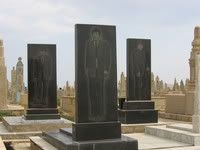
Azerbaijan's graves, with their black granite headstones engraved with an image of the occupant, can be creepy.

My old office had a sea view.
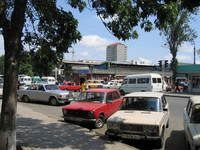
Our neighborhood bazaar.
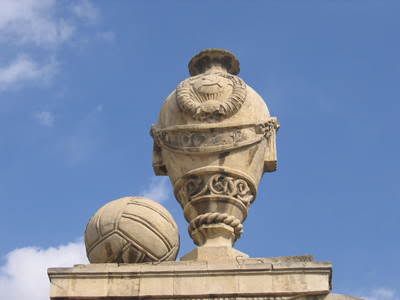
Communist football
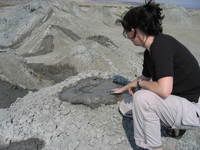
Mud volcanos are very cool.
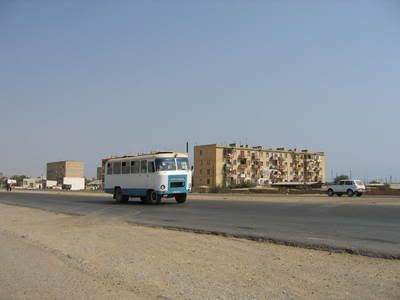
The regions are quite different from Baku.

Coin of the realm.

It's about time.
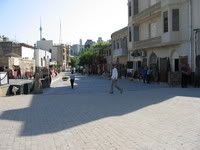
Old City carpet sellers.
Though I suspect the arrival of spring will not make Baku less grim, given recent events.
Pictures are better than substance anyway, right?

Azerbaijan's graves, with their black granite headstones engraved with an image of the occupant, can be creepy.

My old office had a sea view.

Our neighborhood bazaar.

Communist football

Mud volcanos are very cool.

The regions are quite different from Baku.

Coin of the realm.

It's about time.

Old City carpet sellers.
Wednesday, March 02, 2005
Freedom of the Potholed Road
Finally, after more than two months of wrangling, frustration and bureaucratic idiocy, we have at last bought and registered our car.
It's a 1992 Lada Neva. The Soviet-made Neva is possibly one of the coolest designs ever imagined by the human mind. It has been my lifelong dream to own one (if by lifelong you mean "since I first saw one in Kyrgyzstan almost two years ago"). It's so rare when lifelong dreams come true, isn't it?

The Neva must have been specifically designed for Central Asia's bad roads and dreadful climate. It looks like a cross between a Yugo and a Subaru, but is three times tougher than both and much classier. Most have 4WD. Ours doesn't because someone removed it, but for $40, we can have it put back in. My friend owned it and took it all over the place without 4WD, finding it completely satisfactory.
One of the distinguishing characteristics of most Soviet-made cars is their lack of distinguishing characteristics. It doesn't matter if a model was made in 1976 or 1997 -- design differences are apparent only to the trained eye. Lada Nevas, especially, seem to come in one color only -- white -- and every single one looks the same.
We may paint a bulls eye on ours so it can be identified in a crowd.
Surprisingly, cars are one consumer product where it's preferable to buy Soviet-made. Ours was made in 1992, which still counts as Soviet era. The main advantage of a Soviet-made Neva is that its body is steel. It's like driving a bug-shaped tank.
Another advatantage of an old Neva is that any 15 year old with a wrench can repair it. This is a real blessing out in the regions where things frequently go wrong and sophisticated mechanics -- and parts -- are rare.
It's not a sophisticated car. It has a choke (I don't really know what that is) and a creaky gear shift. It might also have heat. It drives like a tractor and doesn't go much faster than 60 mph. While it's true a Neva has to be tuned up frequently (every couple hundred kilometers), it only sets you back a few dollars, or so I've been told.
Recently, Chevrolet bought out the Neva production line and is making new ones that are completely devoid of style or class. I've been told that the new ones have as many problems as the old ones, but parts are expensive and impossible to find.
My company's driver, Rashid, is taking personal responsibility for making all the necessary upgrades. These include, in order of importance: making sure it's clean, getting a new Akumulator (again, I don't know what this is, but a faulty one causes the car not to start sometimes) and putting seatbelts in.
The Neva is an ideal dog car, as long as you don't mind hot dog breath in extremely close proximity to your face. Unfortunately, there are not many places for dogs to go. Once you leave Baku, vicious sheep herding dogs get very protective of their territory. Mo and Whit will continue to stay home. We'll yell "get in the Neva!" and drive around the block, just to keep them engaged.

Let the adventures begin!
It's a 1992 Lada Neva. The Soviet-made Neva is possibly one of the coolest designs ever imagined by the human mind. It has been my lifelong dream to own one (if by lifelong you mean "since I first saw one in Kyrgyzstan almost two years ago"). It's so rare when lifelong dreams come true, isn't it?

The Neva must have been specifically designed for Central Asia's bad roads and dreadful climate. It looks like a cross between a Yugo and a Subaru, but is three times tougher than both and much classier. Most have 4WD. Ours doesn't because someone removed it, but for $40, we can have it put back in. My friend owned it and took it all over the place without 4WD, finding it completely satisfactory.
One of the distinguishing characteristics of most Soviet-made cars is their lack of distinguishing characteristics. It doesn't matter if a model was made in 1976 or 1997 -- design differences are apparent only to the trained eye. Lada Nevas, especially, seem to come in one color only -- white -- and every single one looks the same.
We may paint a bulls eye on ours so it can be identified in a crowd.
Surprisingly, cars are one consumer product where it's preferable to buy Soviet-made. Ours was made in 1992, which still counts as Soviet era. The main advantage of a Soviet-made Neva is that its body is steel. It's like driving a bug-shaped tank.
Another advatantage of an old Neva is that any 15 year old with a wrench can repair it. This is a real blessing out in the regions where things frequently go wrong and sophisticated mechanics -- and parts -- are rare.
It's not a sophisticated car. It has a choke (I don't really know what that is) and a creaky gear shift. It might also have heat. It drives like a tractor and doesn't go much faster than 60 mph. While it's true a Neva has to be tuned up frequently (every couple hundred kilometers), it only sets you back a few dollars, or so I've been told.
Recently, Chevrolet bought out the Neva production line and is making new ones that are completely devoid of style or class. I've been told that the new ones have as many problems as the old ones, but parts are expensive and impossible to find.
My company's driver, Rashid, is taking personal responsibility for making all the necessary upgrades. These include, in order of importance: making sure it's clean, getting a new Akumulator (again, I don't know what this is, but a faulty one causes the car not to start sometimes) and putting seatbelts in.
The Neva is an ideal dog car, as long as you don't mind hot dog breath in extremely close proximity to your face. Unfortunately, there are not many places for dogs to go. Once you leave Baku, vicious sheep herding dogs get very protective of their territory. Mo and Whit will continue to stay home. We'll yell "get in the Neva!" and drive around the block, just to keep them engaged.

Let the adventures begin!
If you've got some time to waste
and want to find out what the US government thinks about what's going on in Azerbaijan in the realm of human rights, check out this link.
There's some interesting stuff in it.
There's some interesting stuff in it.



